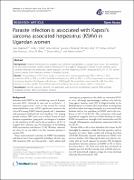Parasite infection is associated with Kaposi’s sarcoma associated herpesvirus (KSHV) in Ugandan women
| dc.contributor.author | Wakeham, Katie | |
| dc.contributor.author | Webb, Emily L | |
| dc.contributor.author | Sebina, Ismail | |
| dc.contributor.author | Muhangi, Lawrence | |
| dc.contributor.author | Miley, Wendell | |
| dc.contributor.author | Johnson, W Thomas | |
| dc.contributor.author | Ndibazza, Juliet | |
| dc.contributor.author | Elliott, Alison M | |
| dc.contributor.author | Whitby, Denise | |
| dc.contributor.author | Newton, Robert | |
| dc.date.accessioned | 2018-07-25T13:51:06Z | |
| dc.date.available | 2018-07-25T13:51:06Z | |
| dc.date.issued | 2011 | |
| dc.identifier.uri | http://hdl.handle.net/20.500.12280/543 | |
| dc.description.abstract | Background: Immune modulation by parasites may influence susceptibility to bacteria and viruses. We examined the association between current parasite infections, HIV and syphilis (measured in blood or stool samples using standard methods) and antibodies against Kaposi’s sarcoma herpesvirus (KSHV), measured by ELISA, in 1915 stored plasma samples from pregnant women in Entebbe, Uganda. Results: Seroprevalence of KSHV was higher in women with malaria parasitaemia (73% vs 60% p = 0.01), hookworm (67% vs 56% p = 0.001) and Mansonella perstans (69% vs 59% p = 0.05); seroprevalence increased with increasing intensity of hookworm infection (p < 0.001[trend]). No associations were found for HIV, five other parasites or active syphilis. These effects were not explained by socioeconomic status or education. Conclusions: Specific parasite infections are associated with presence of antibodies against KSHV, perhaps mediated via their effect on immune function. | en_US |
| dc.language.iso | en | en_US |
| dc.publisher | BioMed Central | en_US |
| dc.relation.ispartofseries | Infectious Agents and Cancer; | |
| dc.subject | Parasite infection | en_US |
| dc.subject | Kaposi’s sarcoma | en_US |
| dc.subject | Herpesvirus (KSHV) | en_US |
| dc.subject | Ugandan women | en_US |
| dc.title | Parasite infection is associated with Kaposi’s sarcoma associated herpesvirus (KSHV) in Ugandan women | en_US |
| dc.type | Article | en_US |


